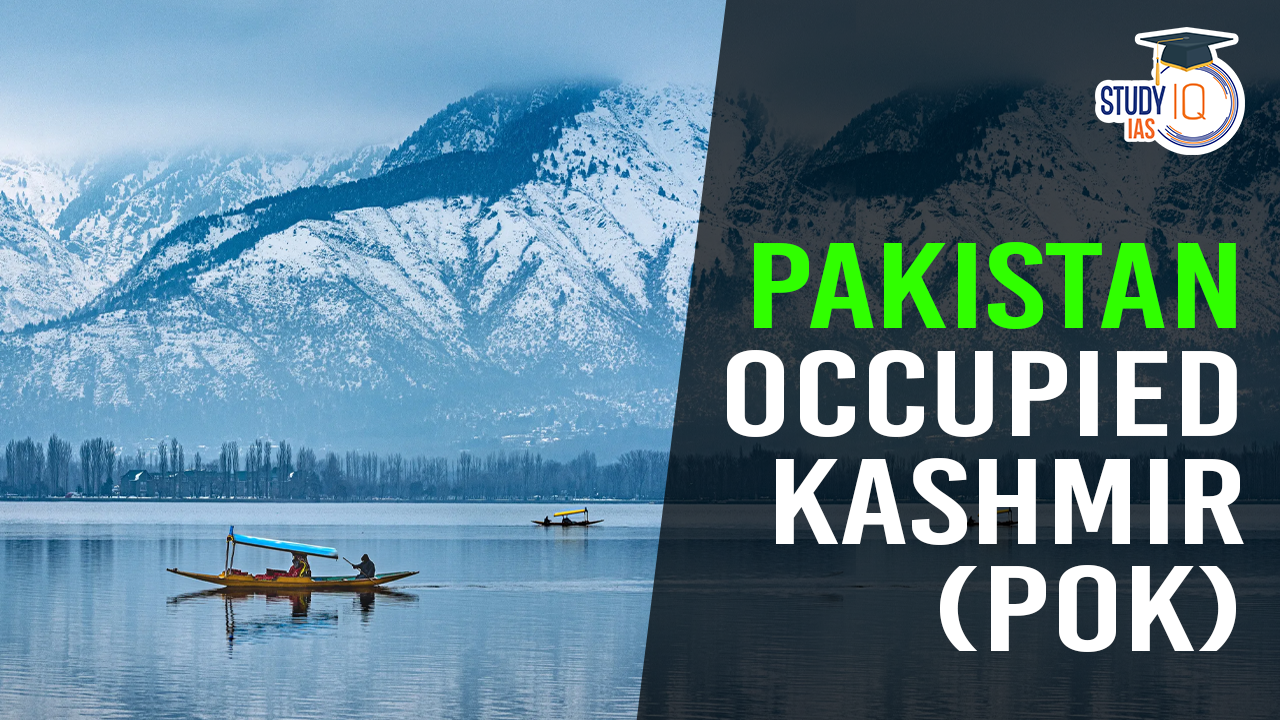Table of Contents
Pakistan-Occupied Kashmir (PoK), also known as Azad Jammu and Kashmir (AJK) by Pakistan, is a critical component of the India-Pakistan conflict over the Kashmir region. It is an area administered by Pakistan but claimed by India and remains one of the most disputed territories in South Asia.
With the recent Pahalgam terror attack in April 2025 and escalating tensions along the Line of Control (LoC), the spotlight is once again on PoK’s role as a hub for terrorism, its strategic location, and India’s assertive stance on reclaiming it.
What is Pakistan-Occupied Kashmir (PoK)?
PoK refers to the region of the former princely state of Jammu and Kashmir that has been under Pakistani control since the first India-Pakistan war of 1947-48. It includes:
-
Azad Jammu and Kashmir (AJK) – the southern portion, with Muzaffarabad as its capital.
-
Gilgit-Baltistan (GB) – the northern part, strategically bordering China and Afghanistan.
History of Pakistan Occupied Kashmir (POK)
In 1947, Pakistan illegally occupied parts of Jammu and Kashmir, which India refers to as Pakistan-occupied Kashmir (PoK). The region is made up of two parts: Azad Jammu and Kashmir (AJK), which includes parts of Kashmir and Jammu, and Gilgit Baltistan, which makes up 86% of the total area of PoK.
| Year | Event |
|---|---|
| 1947 | The princely state of Jammu and Kashmir accedes to India. |
| 1947-1948 | First Indo-Pak war over Kashmir. Ceasefire brokered by the United Nations, leading to the Line of Control (LoC). |
| 1949 | Karachi Agreement between India and Pakistan solidifies the ceasefire line. |
| 1965 | Second Indo-Pak war, no significant territorial changes in Kashmir. |
| 1971 | Third Indo-Pak war, no significant changes in Kashmir, but East Pakistan (now Bangladesh) gains independence. |
| 1989 | Insurgency erupts in Indian-administered Kashmir. |
| 1999 | Kargil War between India and Pakistan was mostly fought in the region of Kargil in Jammu and Kashmir. |
| Present | Pakistan-administered Kashmir (POK) remains under Pakistan’s control. |
India’s Constitutional Position on PoK
India maintains that:
-
PoK is an integral part of India.
-
The Indian Parliament passed a resolution in 1994, unanimously declaring PoK as part of its sovereign territory.
-
India does not recognise the so-called “Azad Kashmir government” and considers any activities there, including elections, as illegal.
Strategic Importance of PoK
Gateway to China – CPEC
-
China-Pakistan Economic Corridor (CPEC), worth over $60 billion, passes through Gilgit-Baltistan, raising Indian objections over sovereignty violations.
Terror Launchpads and Training Camps
-
PoK has served as a launchpad for cross-border terrorism, with terror groups like LeT, JeM, and Hizbul Mujahideen operating freely.
-
Indian intelligence has identified terror training camps in areas like Bhimber, Kotli, and Neelum Valley.
Current Developments in 2025: PoK in the Spotlight
Aftermath of Pahalgam Terror Attack (April 2025)
-
The attackers in the Pahalgam terror attack, which killed 26, including tourists and soldiers, were reportedly infiltrated from launchpads in PoK.
-
India has held Pakistan directly responsible for harbouring and sponsoring terror activities across the LoC.
India’s Renewed Assertion on PoK
-
Post-Pahalgam attack, Indian political and military leadership has:
-
Publicly reiterated the goal of reclaiming PoK.
-
Increased surveillance and drone operations near the LoC and across the border.
-
Reportedly carried out precision retaliatory strikes on terror launchpads in PoK.
-
Diplomatic Tensions
-
India has summoned the Pakistani High Commissioner, demanding the dismantling of terror infrastructure in PoK.
-
Pakistan responded by suspending key agreements, including the Simla Accord, raising international alarm.
Pakistan’s Stand on PoK
-
Pakistan calls PoK “Azad Jammu and Kashmir”, claiming it is self-governing, though in reality, it is heavily controlled by Islamabad.
-
It does not allow foreign media or human rights observers unfettered access to the region.
-
Allegations of human rights abuses, suppression of dissent, and Shia persecution in Gilgit-Baltistan have been raised globally.
International Standpoint
-
The United Nations considers Jammu and Kashmir a disputed territory, urging peaceful resolution.
-
However, no major country recognises PoK as a sovereign entity.
-
China’s presence in Gilgit-Baltistan through CPEC and BRI projects has complicated the dispute, bringing Beijing into the geopolitical equation.
What Lies Ahead?
-
The situation in PoK is increasingly volatile due to terrorism, political instability, and foreign interests.
-
The Indian government’s aggressive posturing, supported by public sentiment, may lead to more assertive actions in the future.
-
With the global focus on terrorism financing and safe havens, India continues to push for global recognition of PoK as illegally occupied.
Conclusion
Pakistan-Occupied Kashmir (PoK) remains at the heart of the India-Pakistan conflict, both militarily and diplomatically. The Pahalgam terror attack of 2025 has reignited calls in India for firm action, and global stakeholders are watching the region closely. For long-term peace and stability, the dismantling of terror infrastructure in PoK and a diplomatic resolution to the Kashmir issue are essential.


 Israel Reopens Rafah Border with Egypt: ...
Israel Reopens Rafah Border with Egypt: ...
 Next Phase for Rural Women Entrepreneurs...
Next Phase for Rural Women Entrepreneurs...
 UPSC CSE 2026 New Rules: Complete Guide ...
UPSC CSE 2026 New Rules: Complete Guide ...

























